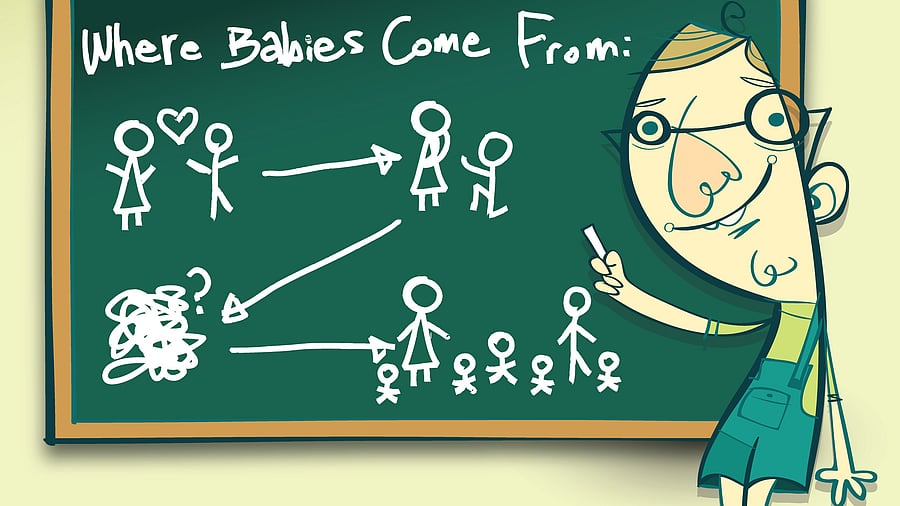
Experts say it's better to call it sexuality education than sex education.
Credit: iStock Photo
The Congress government is silently taking measures to introduce sex education in schools from the current academic year itself. To avoid controversy, it is calling it ‘adolescent education’.
Six months after announcing it in the Legislative Council during the Belagavi session in December 2024, Minister for School Education and Literacy Madhu Bangarappa has given a task to his department to take necessary measures for implementation of sex education in schools, from class 8 to 12.
Confirming this to DH, Commissioner for Department of School Education Dr Trilokchandra K V said the curriculum was being prepared at Department of School Education Research and Training (DSERT).
To avoid opposition, the department is treading carefully and calling it ‘adolescent education’ and introducing it as part of moral science education.
“DSERT is preparing the age-appropriate curriculum,” said Trilokchandra.
As shared by officials, the plan is to implement adolescent education with separate books.
Once it is ready, the curriculum will be sent to the District Institutes of Education & Training (DIETs), where teachers will be trained on how to teach the content.
“We have seen teachers expressing unwillingness to teach about sexuality to children. Such stigma must be removed first from the minds of teachers and parents,” said a senior official of the department who was part of the committee which submitted draft recommendations on the content.
Officials said adolescent education is part of the 80 plus values prescribed by the union government to be incorporated in curriculum.
Though there were recommendations from various organisations including UNICEF to educate children about sexuality from an early age, no government in the past was able to take the bold step to implement it, following opposition by parents, teachers, political and religious leaders among others.
In 2007, due to pressure from experts and child rights activists, the then Kumaraswamy government tried to implement sex education from class 8 to 12.
As the idea was met with criticism and opposition, the same was dropped.
During BJP’s last tenure, the then school education minister B C Nagesh decided to implement the same by taking religious leaders and experts into confidence.
The plan was dropped after a few meetings. Now, Madhu Bangarappa has taken the initiative and is confident of implementing it. According to experts, educating children regarding sex was much needed.
D Shashi Kumar, general secretary of Associated Management of Primary and Secondary Schools in Karnataka welcomed the move.
He said, “We are stressing this for several years now. Hope it will be effectively introduced now. As children have exposure to everything today easily, it is our responsibility to educate them on which is right at what age and what is wrong. The problem is the moment we say sex education, parents and others start opposing it. That stigma has to be removed through awareness.”
Kumar said, “Nowadays children are attaining puberty at class 4 and 5 and hormonal stimulation starts as early as 10 or 11 years of age. We need to teach them body hygiene, about changes in the body at that age and thereafter. All this comes under sex education”. Several private schools have already introduced sex education.
In a written reply to the House, the minister said the same.
“Sex education classes will help children handle hormonal modifications which lead to physical, mental and emotional changes,” he said.
Stressing on the importance of using the term sexuality, instead of sex education, Vasudeva Sharma, executive director of Child Rights Trust, said, “What we were calling as infatuation has become adolescent sexual behaviour now and it is quite normal. It is true that the influence is everywhere. Social media, cinema, OTT and even the surroundings. Children are getting to witness such open behaviour in parks, metro, bus, trains and other public places. This is influencing them. Instead of sex education, we should call it sexuality education to overcome stigma”.
Sharma said sexuality education will help children to understand the bodily changes in them and also in the opposite sex.
“Knowing the importance of their own bodies and understanding and respecting that of others is very important. It will help to protect themselves,” he said.
Sharma cited increase in teen pregnancies and said providing sexuality education will help prevent such instances.
“Child marriage, teen pregnancies and other issues can be prevented by giving age-appropriate sexuality education,” he said.
Nagasimha G Rao, child rights advocate,
said, “Children and adolescents are grappling with confusion due to lack of clear, reliable information about sex, compounded by the absence of sex education in schools. This time too, I feel many parents will oppose.
Children are increasingly exposed to pornographic content, which poses significant risks”.
He said the UNCRC (United Nations Convention on the Rights of the Child) optional protocol 2 mandates that governments protect children from such content and provide accurate sexual health information.
“Implementing sex education can help prevent early pregnancies and reduce cases under Protection of Children from Sexual Offences (POCSO) Act. To address this, the government should develop a comprehensive sex education curriculum and provide specialised training for teachers, prioritising best interests of children,” Rao said.
Chairperson of Karnataka State Commission for Protection of Child Rights Naganna Gowda advised the department to include POCSO Act in the content.
